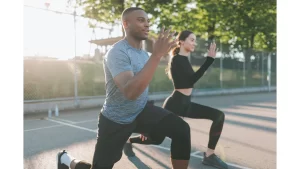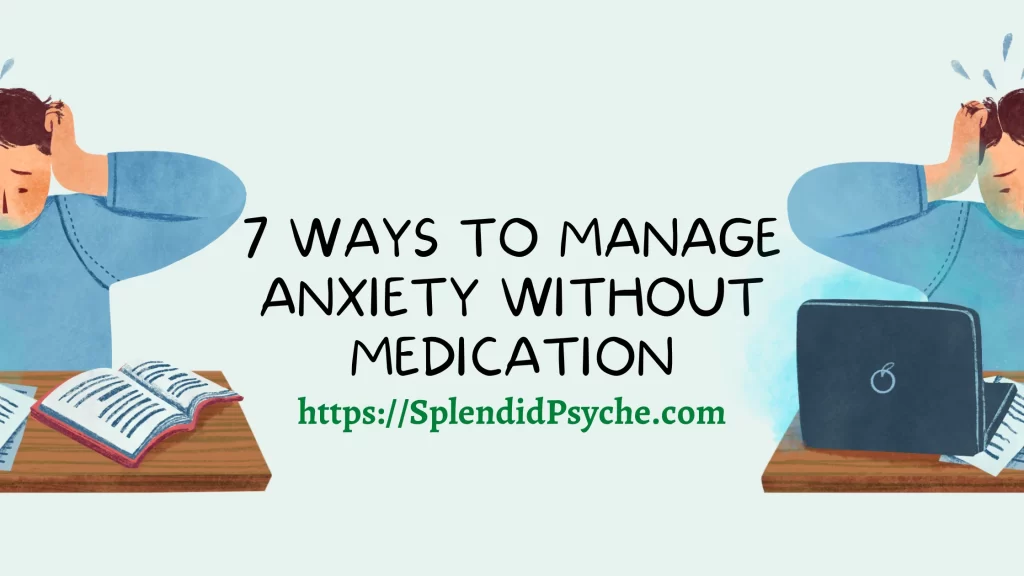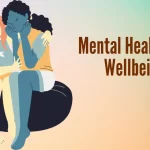How to Manage Anxiety Without Medication: Effective Strategies for Relief
Anxiety is a common feeling that everyone goes through occasionally. However, when anxiety becomes overwhelming and persistent, it can significantly impact your quality of life. While medication can be an effective treatment option, many people prefer to explore natural and drug-free methods for managing anxiety. In this article, we’ll discuss various techniques and strategies on how to manage anxiety without medication.

Understanding Anxiety
Before delving into the strategies on how to manage anxiety without medication, it’s essential to understand what anxiety is and how it manifests. Anxiety is a state of apprehension, worry, and unease about future events or situations. It’s often accompanied by physical symptoms such as rapid heartbeat, sweating, muscle tension, and difficulty concentrating.
Causes of anxiety can vary from person to person and may include genetics, stress, trauma, medical conditions, or environmental factors. It’s important to note that anxiety is a natural response to perceived threats or challenges, and it’s not something to be ashamed of or ignore.
Effective Strategies on How to Manage Anxiety Without Medication
- Cognitive-Behavioral Therapy (CBT)
Cognitive-Behavioral Therapy (CBT) is a popular and effective form of psychotherapy that can help you manage anxiety by changing negative thought patterns and behaviors. CBT teaches you to identify and challenge irrational thoughts and beliefs that contribute to anxiety. It also provides strategies for coping with stress and anxiety-provoking situations.
Through CBT, you’ll learn how to manage anxiety without medication by recognizing and modifying unhelpful thought patterns, developing problem-solving skills, and gradually exposing yourself to feared situations in a controlled and safe environment. Working with a qualified therapist can significantly improve your ability on how to manage anxiety without medication.
- Mindfulness and Meditation
It has been demonstrated that practicing mindfulness and meditation can help lessen the symptoms of anxiety. Mindfulness involves bringing your attention to the present moment, accepting your thoughts and feelings without judgment, and cultivating a sense of calm and awareness.
Practicing mindfulness meditation can help you become more aware of your thought patterns and emotions, allowing you to respond to stressful situations with greater clarity and control. Regular meditation has been found to lower levels of the stress hormone cortisol, improve emotional regulation, and promote relaxation.
- Exercise and Physical Activity
Regular exercise and physical activity can be powerful tools in the fight against anxiety. When you exercise, your body releases endorphins, which are natural mood-boosters and can help reduce stress and anxiety levels. Additionally, exercise can improve sleep quality, boost self-confidence, and provide a healthy outlet for pent-up energy and tension.
On most days of the week, try to get in at least 30 minutes of moderate exercise, including brisk walking, cycling, or swimming. You can also explore mind-body practices like yoga, tai chi, or qigong, which combine physical movements with deep breathing and mindfulness techniques.
- Relaxation Techniques
Learning and practicing relaxation techniques can be an effective way to manage anxiety without medication. These techniques can help counteract the physical symptoms of anxiety, such as rapid breathing, muscle tension, and increased heart rate.
Some popular relaxation techniques include:
- Deep breathing exercises
- Progressive muscle relaxation
- Visualization
- Guided imagery
- Listening to calming music
By incorporating relaxation techniques into your daily routine, you can train your body and mind to respond more calmly to stressful situations.
- Social Support
Building a strong social support system can be invaluable in managing anxiety. Connecting with friends, family, or support groups can provide a sense of belonging, validation, and encouragement, which can help reduce feelings of isolation and loneliness often associated with anxiety.
Sharing your experiences and challenges with others who understand can be therapeutic and can help you gain new perspectives and coping strategies. Additionally, engaging in social activities and maintaining healthy relationships can provide a positive distraction from anxiety-provoking thoughts and situations.
- Lifestyle Changes
Making certain lifestyle changes can significantly improve your ability to manage anxiety without medication. These changes include:
- Getting enough sleep: Lack of sleep can exacerbate anxiety symptoms, so aim for 7-9 hours of quality sleep each night.
- Improving your diet: A balanced diet rich in nutrients can support emotional well-being and help regulate mood and energy levels.
- Reducing caffeine and alcohol intake: Both caffeine and alcohol can contribute to or worsen anxiety symptoms.
- Managing stress: Identifying and addressing sources of stress in your life can help prevent anxiety from becoming overwhelming.
- Practicing self-care: Engaging in activities that promote relaxation and enjoyment can help reduce anxiety and improve overall well-being.
- Herbal Remedies and Supplements
While they are not a substitute for professional treatment, some herbal remedies and supplements may help alleviate mild to moderate anxiety symptoms. However, it’s important to consult with a healthcare professional before trying any new supplements, as they can interact with medications or have potential side effects.
Some commonly used herbal remedies and supplements for anxiety include:
- Chamomile
- Lavender
- Valerian root
- Omega-3 fatty acids
- Vitamin B complex
- Magnesium
It’s crucial to remember that these remedies should be used in conjunction with other strategies and under the guidance of a qualified healthcare provider.
Seeking Professional Help
While the strategies outlined above can be effective for managing anxiety without medication, it’s important to recognize when professional help is needed. If your anxiety is severe, persistent, or interfering with your daily life, it’s recommended to seek help from a mental health professional.
A therapist or counselor can provide personalized guidance and support, as well as develop a comprehensive treatment plan tailored to your specific needs. They may also recommend medication if deemed necessary, in combination with other therapeutic approaches.
Managing anxiety without medication is possible, but it requires a commitment to implementing effective strategies and making lifestyle changes. By incorporating techniques such as cognitive-behavioral therapy, mindfulness and meditation, exercise, relaxation techniques, social support, and lifestyle adjustments, you can take an active role on how to manage anxiety without medication, reducing anxiety and improving your overall well-being.
Remember, everyone’s experience with anxiety is unique, and what works for one person may not work for another. It’s important to be patient, persistent, and open to trying different approaches until you find the combination that works best for you. With the right tools and support, you can learn how to manage anxiety without medication and regain control over your life.
Frequently Asked Questions
What is the anxiety 3-3-3 rule?
The 3 3 3 rule is a simple grounding technique that can help you calm anxiety and regain control when you’re feeling overwhelmed. It involves:
- Name 3 things you see in your surroundings
- Name 3 sounds you hear
- Move 3 parts of your body
This exercise helps shift your focus away from anxious thoughts and brings you back to the present moment through your senses. It interrupts the anxiety spiral by engaging different parts of your brain.
How can I calm my anxiety without medication?
There are several effective ways to calm anxiety without medication:
- To trigger the relaxation response in your body, engage in deep breathing exercises.
- Use progressive muscle relaxation by tensing and releasing muscle groups.
- Try mindfulness meditation to become grounded in the present.
- Get regular exercise like walking, yoga, or cycling to release pent-up energy.
- Listen to calming music or audio guides for relaxation.
- Write in a journal to process anxious thoughts.
- Talk to a friend or do an engaging activity to distract yourself.
How can I calm my anxiety naturally?
Natural remedies for calming anxiety include:
- Herbal teas like chamomile, lavender, or lemon balm which have calming effects.
- Aromatherapy with essential oils like lavender or bergamot.
- Stress-reducing supplements like ashwagandha, L-theanine, GABA, or magnesium glycinate.
- Getting regular massage therapy to promote relaxation.
- Trying acupuncture, which may help rebalance the nervous system.
- Using CBD oil or other hemp/cannabis products with calming properties.
- Following an anti-anxiety diet rich in complex carbs, omega-3s, and magnesium.
How do you fix constant anxiety?
For constant, persistent anxiety, a multi-pronged approach often works best:
- Cognitive behavioral therapy (CBT) to change anxious thought patterns.
- Exercise, meditation, deep breathing, and relaxation practices.
- Building a strong support system of family/friends.
- Stress management techniques like time management and assertiveness training.
- Eliminating dietary triggers like caffeine, alcohol, and refined sugars.
- Getting enough quality sleep through good sleep hygiene.
- If anxiety is severe, exploring medication temporarily under a doctor’s guidance.
Does constant anxiety ever go away?
Constant anxiety often doesn’t just disappear on its own without taking steps to address it. However, with the proper treatment and lifestyle changes, it is very possible for the anxiety to become manageable and decrease dramatically over time. Some people achieve full remission, while others continue to use techniques to keep it under control as needed.
Why am I getting anxiety every day?
There can be several potential reasons for daily, persistent anxiety:
- An underlying medical condition like thyroid issues, anemia, or chronic pain.
- Unresolved trauma, grief, or major stress in your life currently.
- Prescription medications with anxiety as a side effect.
- Excessive caffeine, recreational drugs, or alcohol use.
- Poor diet, lack of exercise, and inadequate sleep.
- Genetics and brain chemistry, which can predispose some people to anxiety.
- Unhelpful thought patterns that fuel anxious thinking.
Identifying the root causes through self-reflection or professional help can guide you toward the right solutions on how to manage anxiety without medication.


